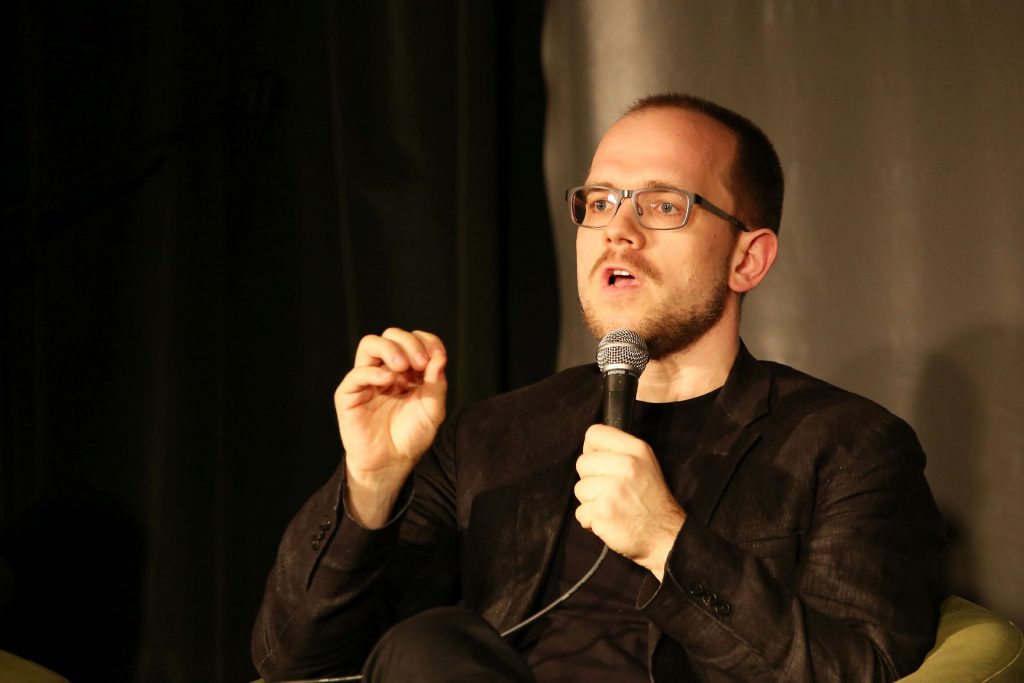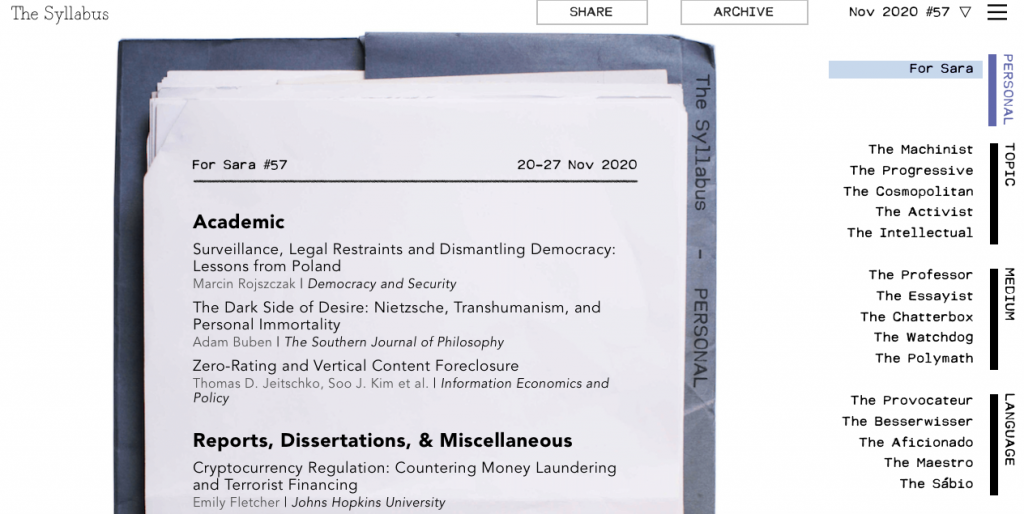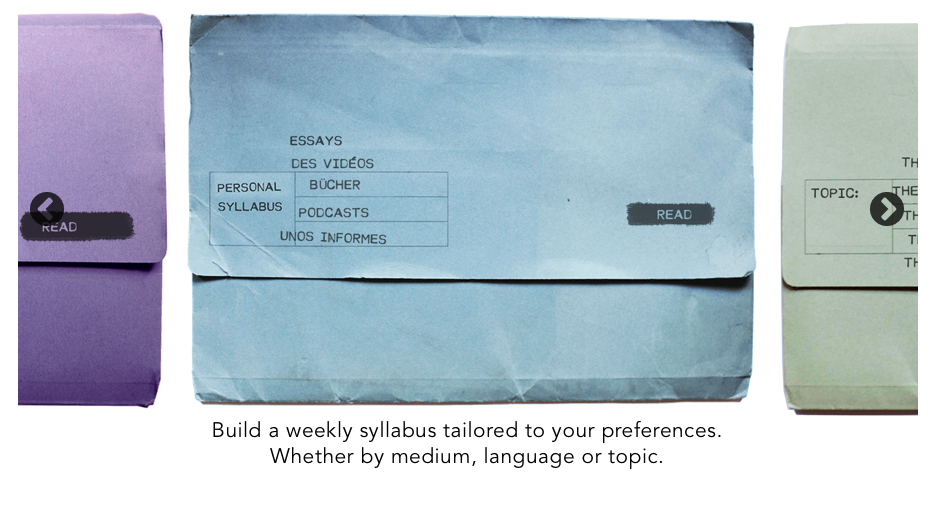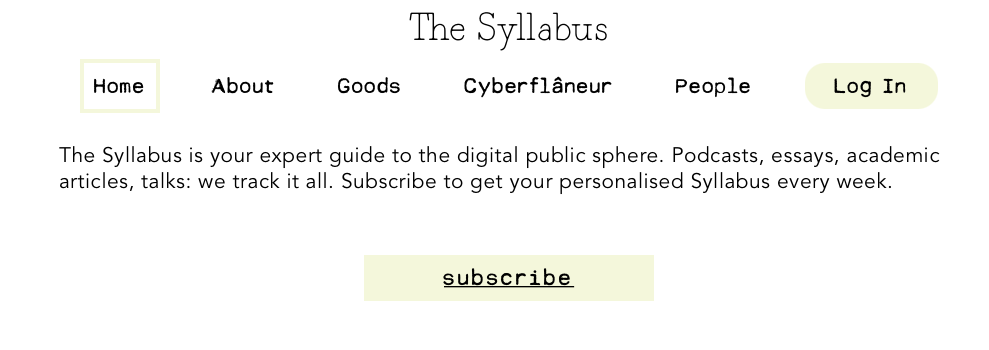Is Evgeny Morozov’s The Syllabus the real Google antidote?

“I’ve wondered what it would be like to have a brilliant research assistant who could find material about many disparate things I try to follow. Now I know: The Syllabus turned up material I just never would have come across otherwise… It’s bloody magic.”
Brian Eno on The Syllabus
In the autumn of 2019, technology critic and writer Evgeny Morozov launched the online information-service The Syllabus. Tech-journalist Maurits Martijn was there in the days leading up to the launch, calling the new service the anti-Google, predicting that it would break with the laws of the attention economy. Looking at the medium one year later, can we really speak of The Syllabus as a Google antidote? What is new about this online service and how does the philosophy behind it relate to the broader academic debate about the attention economy and the current information overload?
Accessing your Syllabus cabinet
The Syllabus revolves mainly around two services, a website and a curated email service. On the website users can access their ‘cabinet’ that is filled with a constantly updated selection of books, academic articles, podcasts and videos on various subjects, curated by Morozov and his team. Additionally, users can choose to receive weekly emails with content recommendations based on their preferences. The different topics users can choose from are based upon Morozov’s broad research interests, varying from ‘Politics as technology’ to ‘Just transition and climate change.

Balance your information diet
When browsing through the Syllabus, a number of things stand out. Both the website and the newsletters have basic interfaces: there are little or no images and no appealing fonts. There is only necessary information regarding the recommended content. This simplicity is also reflected in the design of the website, that is designed like a set of printed documents – as if you are browsing through a paper syllabus. The basic set-up and old-fashioned feeling of the Syllabus, together with used words such as ‘cabinet’ and ‘syllabus’, can be interpreted as a protest against the current attention economy and services like Google and Facebook, that Morozov describes as the “junk food of Silicon Valley”. With the Syllabus Morozov aims to make quality content discoverable, offering readers their ‘intellectual spinach’ as an antidote to the ‘Silicon Valley junk food’: “Nothing is at stake here but the ignorant man who perishes due to clicks and likes”.
Why The Syllabus is emergent
At first glance, there does not seem to be much new about The Syllabus. The service uses existing structures such as categorization by means of an algorithm and personalization and the design even can be perceived as ‘old-fashioned’. Nevertheless, the philosophy and logic behind The Syllabus can be viewed as new and emerging. This, and the use of ‘vintage’ features in combination with the simple design can be considered as an objection to the power of big technological companies and the use of attention as a commodity. With The Syllabus, Morozov criticizes the way in which online information is discovered and disseminated: based on clicks, likes and shares – based on popularity. This criticism is part of a broader academic debate, which discusses the algorithmic mediation of knowledge [1], Google’s hegemony over online content [2] and how search-engines have become dominant instruments in the production of knowledge [3] – where popularity (and thus visibility) has ‘everything to do with quantity and very little with quality or relevance’ [4].

How it fits within Morozov’s philosophy
The critique that Morozov expresses with the The Syllabus fits within his broader philosophy and previous conceptions regarding the digital age. Among other things, Morozov is skeptical about the view that the internet is helping to democratize authoritarian regimes, arguing that it could also be used as a powerful tool for mass surveillance and political repression. More recently he wrote about the ‘cyberflâneur’ and how there was the vision that “what the city and the street were to the flaneur, the internet and the superhighway have become to the cyberflâneur”. However, he claims that the internet of today has made it impossible to (preferably incognito) stroll the internet: “It is no longer a place to stroll, but a place to get things done”. He dedicates this to the constant need for speed and efficiency of our time. As a countermeasure Morozov therefore developed the category ‘Cyberflâneur’ within the Syllabus, where every week different artists, academics and intellectuals take users on a ‘stroll’ through different recommended links.
The highly curated digital archive
The content from The Syllabus is derived from several different sources, such as scientific publishers, universities and newspapers. Content that otherwise, according to Morozov and his team, is ‘likely to get lost in the noise of social media’. Everyday a team monitors the thousands of sources that are retrieved by the algorithm for quality and novelty, creating a short-list that gets individually reviewed by the human-editors. Behind the organization of The Syllabus is a group of around seventeen people who are closely involved in the project. These team-members have all kinds of different back-grounds, making them a diverse, but mostly academic educated team. The Syllabus can be seen as a highly curated digital archive, with Morozov and his team as the archivists of a highly curated canon: filled with qualitative content from different fields of research. The website can be considered as a para-academics library, as it stands in a parallel position in relation to the academic field.

Have we found the Google anit-dote?
Now all that remains is the question, have we finally found a Google anti-dote? One the one hand, yes we did. The Syllabus is a carefully curated digital archive that contains high quality content, with a plain but clear design that simply offers the needed information, no ads and pop-ups involved. On the other hand, Morozov and his team are not fully transparent on how the algorithm for the content retrieval works. It is therefore not exactly clear how the algorithm mediates the knowledge presented. Furthermore, both platforms ask for a different form of use. You will probably go to Google for finding the answer to your question and visit The Syllabus to ‘flaneur’ and to let yourself be surprised by the content offered. I think that The Syllabus is a good addition to our current media diet, offering us our intellectual spinach. At the same time, it is okay to sin now and then: binging some Silicon Valley junk food.
References
- Shirky, Clay. Ontology is Overrated: Categories, Links and Tags. Summary of conference talks. 2005. https://oc.ac.ge/file.php/16/_1_Shirky_2005_Ontology_is_Overrated.pdf.
- Lovink, Geert. “The Society of the Query and the Googlization of Our Lives: A Tribute to Joseph Weizenbaum.” Eurozine. 5 September 2008. https://www.eurozine.com/the-society-of-the-query-and-the-googlization-of-our-lives/.
- Ramsay, S. 2010. “The Hermeneutics of Screwing Around. Or What to Do With One Million Books.” Pastplay: Teaching and Learning History with Technology. Michigan: University of Michigan Press, 2014:111-20.
- Van Dijck, José. “Search Engines and the Production of Academic Knowledge.” International Journal of Cultural Studies 13. (2010): 574-592.